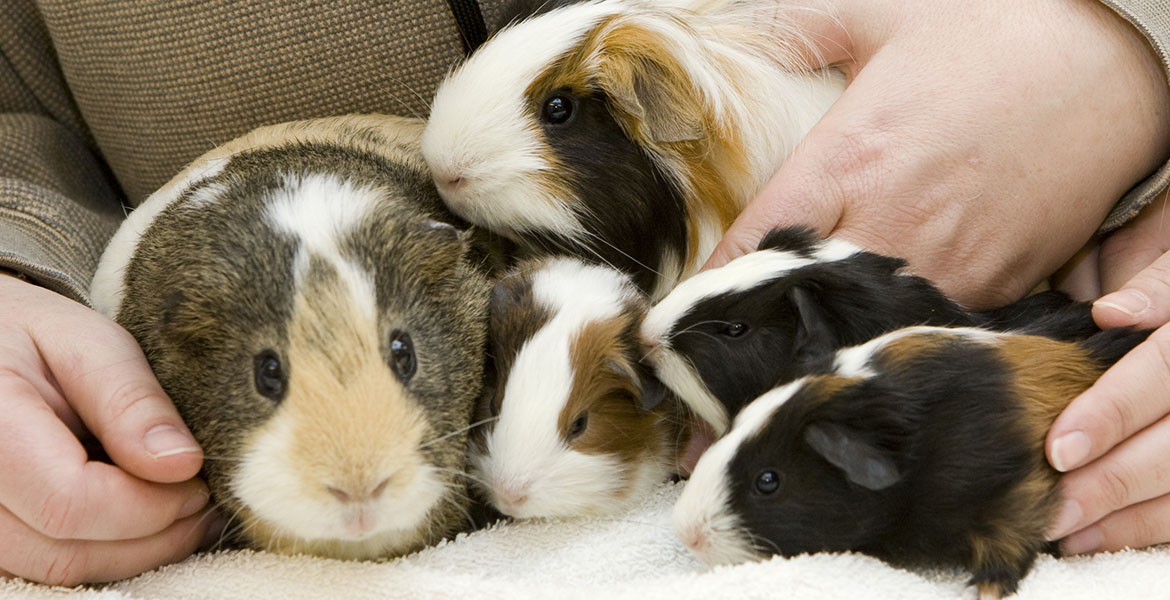
Guinea Pigs as Pets
Monday, May 4, 2020
Guinea pigs make great pets. They live for several years, so you can enjoy them longer than most other rodents. They have different personalities and are very vocal, making it easy to know their individual identities and get attached. They are fun to play with and very entertaining. I recommend guinea pigs as pets for anyone, especially as a first pet for a child.
There are three types of guinea pigs — the domestic short hair, the Abyssinian, which looks like it has tousled unkempt hair, and the Peruvian, which has long, silky hair.
Guinea pigs should be housed in large, solid bottom cages with ample bedding such as timothy hay or corn cob chips. A cage needs to be large enough for them to run around and play. They also like a hut or hutch they can hide in.
Guinea pig chow should be offered daily in bowls and water should be provided in bottles with sipper tubes. Keep a close eye on the water as guinea pigs love to play with the sipper tubes and spit food back into the bottle, so it gets dirty quickly and sometimes the stopper gets clogged. The diet can be supplemented with some fruits and vegetables, but the pellets should be the largest part of the diet. Remove uneaten fruits and vegetables daily as they can spoil.
Guinea pigs lack an enzyme that allows them to make vitamin C so it must be added to the diet. Giving your pet some orange at least weekly will meet the requirement. You can also purchase vitamin C supplements at pet stores. Insufficient vitamin C can result in your guinea pig getting scurvy. Classic signs include weakness, hemorrhages, reluctance to move around, and even swollen joints.
The bedding in the cage should be changed every one to two weeks to prevent the buildup of ammonia.
Guinea pigs are very vocal animals. You will be able to communicate with your guinea pig after you learn its sounds. They have an entire vocabulary for communicating with you.
Guinea pigs are also very social animals. They do better with a friend, but be careful that they are the same sex or you will start a breeding colony. Guinea pigs can start breeding at one month of age. Their gestation length is 69 to 73 days. The pups are born precocious, fully furred with their ears and eyes open. They will start eating chow on day one and wean at three weeks.
Keeping your guinea pig happy and healthy is very important. You can purchase toys such as balls and tubes where you insert hay or other treats. There are even tunnels that guinea pigs can play in. Adding a hide hut is a very good idea. Since their teeth grow forever, things to chew on will be utilized often. Cardboard tissue paper rolls and even wooden chew sticks are nice.
Online guinea pig owner groups on Facebook and Meetup are open forums where owners can discuss issues about their pets, post pictures and such. They may be full of good advice, but follow your veterinarian’s advice for any health issues.
When a guinea pig gets sick, it stops grooming, so an unkempt coat is one of the first signs of illness. An ill guinea pig will not move around or vocalize normally. Check their underbelly often to see if they are having any gastrointestinal or urinary issues. Guinea pigs make two types of feces, as they eat some of the feces to obtain the vitamins that were made in the cecum. So if you see your guinea pig eating from its anus, that is normal. If you notice diarrhea or pasting of feces around the anus, get your animal to the veterinarian immediately. Dehydration can kill a guinea pig quickly.
STORY BY: Patricia Coan, DVM, Ph.D., an associate clinical professor in the Department of Veterinary Clinical Sciences at the College of Veterinary Medicine and the associate director of Animal Resources at Oklahoma State University. She is a diplomate of the American College of Laboratory Animal Medicine.
